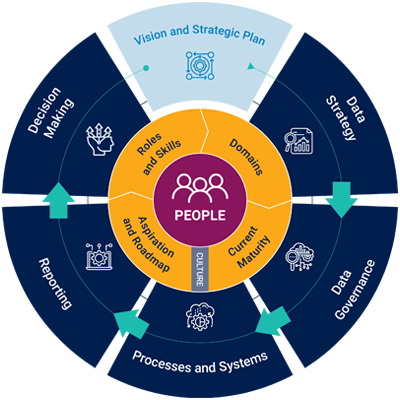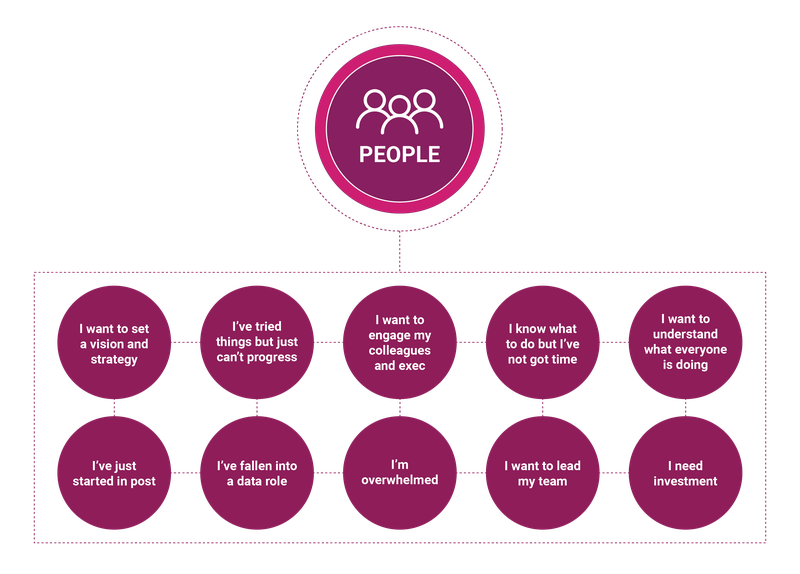People: your role and data maturity
The data maturity framework is useful for people in different roles, with varied experiences and priorities.

People sit in the centre of the data maturity framework. We want to encourage the view that data is about people and how they work, both together and independently.
Technology is an enabler but people should drive strategies or solutions by:
- Making decisions and setting strategies.
- Making policies and aiming to adhere to them in their daily work.
- Designing systems and processes to record information.
- Seeking reporting which is designed and built.
- Using reports to make decisions.
People in different roles, with varied experiences and priorities, may find the framework useful. We hope our sector colleagues will find information that develops knowledge or provides structure to data management and reporting activities.
Common priorities
It is our intention that you can access the materials that will support you with the priorities you have. You may fall into several of these categories:

- I've just started in post.
- I've fallen into a data role.
- I'm overwhelmed.
- I want to lead my team.
- I need investment.
- I want to understand what everyone else is doing.
- I know what to do but I haven't got the time.
- I want to engage my colleagues and exec.
- I've tried things but just can't progress.
- I want to set a vision and strategy.
Using the data maturity framework
You may fit in multiple categories and find value in several areas of the framework. The help section will help direct you to the materials that may be most beneficial.
For a general introduction to data maturity - and the data maturity framework - take our data maturity e-learning course. This CPD accredited course is designed for both new starters and existing staff at any level that require an introduction to data maturity, providing best practice on managing data more effectively across different roles in your organisation.
To access the maturity statements, please go to the roadmap section.
I've just started in post/I'm overwhelmed
Provide clarity and structure
Demystify concepts surrounding this topic by using clear language, visualisation and providing structure.
Provide clarity and structure
Demystify concepts surrounding this topic by using clear language, visualisation and providing structure.
I've fallen into a data role/I want to engage my colleagues and exec
Baseline
Help you understand what a foundation level for data maturity is and why this is important to achieve.
Baseline
Help you understand what a foundation level for data maturity is and why this is important to achieve.
I want to set a vision and strategy/I want to lead my team.
Approach
Link the topics covered to your strategic goals and encourage the view of managing data as an asset.
Approach
Link the topics covered to your strategic goals and encourage the view of managing data as an asset.
I've tried things but just can't progress/I want to understand what everyone else is doing.
I want to engage my colleagues and exec/I know what to do but I haven't got the time.
Assessment and roadmap
Support an honest appraisal of data maturity through self-assessment and five levels of maturity.
Assessment and roadmap
Support an honest appraisal of data maturity through self-assessment and five levels of maturity.
I need investment/I want to engage my colleagues and exec
People before technology
Encourage the view of technology as an enabler focusing on strategic vision and the role of people first.
Risks
Help you engage your colleagues in recognising the risks related to low data maturity.
People before technology
Encourage the view of technology as an enabler focusing on strategic vision and the role of people first.
Risks
Help you engage your colleagues in recognising the risks related to low data maturity.
How to communicate the progress you make
Success is measured by a reduction in the impact of data issues on operations, evidencing changes to processes, tools and accountability, and the recognition of value generated from data enabled insights.
How can the framework help you?
Delivery is about taking opportunities where and when you can, but within the context of an overall plan.
The data maturity framework is copyright Jisc and made available under CC BY-NC-ND. Find out more about using content from the data maturity framework.